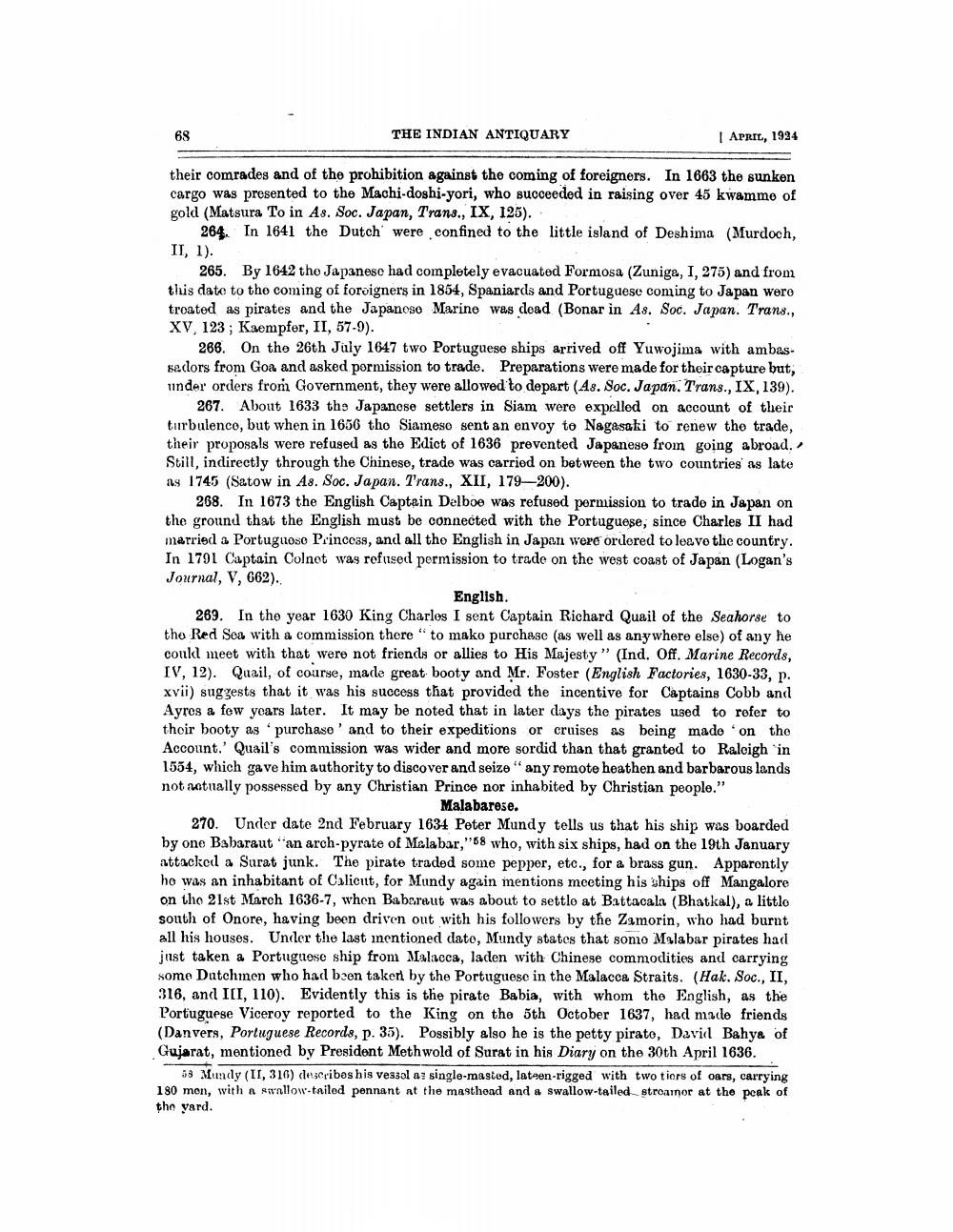________________
68
THE INDIAN ANTIQUARY
APRIL, 1924
their comrades and of the prohibition against the coming of foreigners. In 1663 the sunken cargo was presented to the Machi-doshi-yori, who succeeded in raising over 45 kwamme of gold (Matsura To in As. Soc. Japan, Trans., IX, 125).
264. In 1641 the Dutch' were confined to the little island of Deshima (Murdoch,
II, 1).
265. By 1642 the Japanese had completely evacuated Formosa (Zuniga, I, 275) and from this date to the coming of foraigners in 1854, Spaniards and Portuguese coming to Japan were troated as pirates and the Japanese Marine was dead (Bonar in As. Soc. Japan. Trans., XV, 123 ; Kaempfer, II, 57-9).
266. On the 26th July 1647 two Portuguese ships arrived off Yuwojima with ambassadors from Goa and asked pormission to trade. Preparations were made for their capture but, under orders from Government, they were allowed to depart (As. Soc. Japan. Trans., IX, 139).
267. About 1633 the Japanese settlers in Siam were expelled on account of their turbulenco, but when in 1656 tho Siameso sent an envoy to Nagasaki to renew the trade, their proposals were refused as the Edict of 1636 prevented Japanese from going abroad. Still, indirectly through the Chinese, trade was carried on between the two countries' as late as 1745 (Satow in A8. Soc. Japan. T'rans., XII, 179—200).
268. In 1673 the English Captain Delboe was refused permission to trado in Japan on the ground that the English must be connected with the Portuguese, since Charles II had married a Portuguese Princess, and all the English in Japan were ordered to leave the country. In 1791 Captain Colnot was refused permission to trade on the west coast of Japan (Logan's Journal, V, 662).
English. 269. In the year 1630 King Charles I sent Captain Richard Quail of the Seahorse to the Red Sea with a commission there "to mako purchase (as well as anywhere else) of any he could meet with that were not friends or allies to His Majesty " (Ind. Off, Marine Records, IV, 12). Quail, of course, made great booty and Mr. Foster (English Factories, 1630-33, p. xvii) suggests that it was his success that provided the incentive for Captains Cobb and Ayres a few years later. It may be noted that in later days the pirates used to refer to thoir booty as purchase' and to their expeditions or cruises es being made on the Account.' Quail's commission was wider and more sordid than that granted to Raloigh in 1554, which gave him authority to discover and seize any romote heathen and barbarous lands not actually possessed by any Christian Prince nor inhabited by Christian people."
Malabarese. 270. Under date 2nd February 1634 Peter Mundy tells us that his ship was boarded by one Babaraut an arch-pyrate of Malabar,"58 who, with six ships, had on the 19th January attacked a Surat junk. The pirate traded some pepper, etc., for a brass gun. Apparontly ho was an inhabitant of Calicut, for Mundy again mentions meeting his ships off Mangalore on the 21st March 1636-7, when Babaraut was about to settlo at Battacala (Bhatkal), a littlo south of Onore, having been driven out with his followers by the Zamorin, who had burnt all his houses. Under the last inentioned dato, Mundy states that somo Malabar pirates had just taken a Portuguese ship from Malacca, laden with Chinese commodities and carrying some Dutchmen who had been taken by the Portuguese in the Malacca Straits. (Hak. Soc., II, 316, and III, 110). Evidently this is the pirate Babia, with whom the English, as the Portuguese Viceroy reported to the King on the 5th October 1637, had madlo friends (Danvers, Portuguese Records, p. 35). Possibly also he is the petty pirato, David Bahy& of Gujarat, mentioned by President Methwold of Surat in his Diary on the 30th April 1636.
58 Mundy (IT, 316) describes his veszol a single-mastod, lateen-rigged with two tiers of oars, carrying 180 mon, with snllow-tailed pennant at the masthead and a swallow-tailed stroainor at the peak of the yard.




